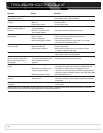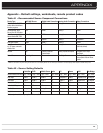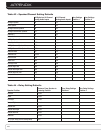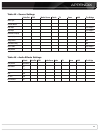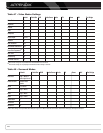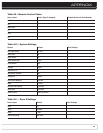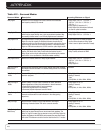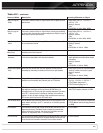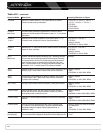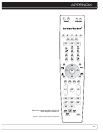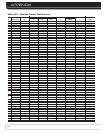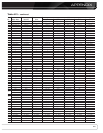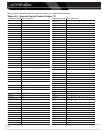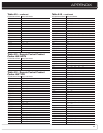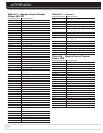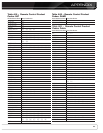
56
APPENDIX
Table A12 – continued
Surround Mode Description Incoming Bitstream or Signal
DTS Stereo Delivers a 2-channel downmix of DTS Digital materials, or presents • DTS 1/0/.0 or .1,2/0/.0 or .1, 3/0/.0 or .1,
a matrix-encoded surround presentation. 3/1/.0 or .1, 2/2/.0 or .1, 3/2/.0 or .1
• DTS 96/24
• DTS-ES Matrix
• DTS-ES Discrete
DTS Neo:6 DTS Neo:6 analog processing is available with DTS and DTS 96/24 See below
Mode Group
signals and 2-channel analog or PCM signals to create a 3-, 5- or 6-channel
presentation.
DTS Neo:6 Depending on the number of speakers in your system, select 3-, 5- or • DTS 2/2/.0 or .1, 3/2/.0 or .1
Cinema 6-channel modes, enhanced for movie or video presentations. • DTS 96/24
• Analog (2-channel)
• PCM (32kHz, 44.1kHz or 48kHz)
DTS Neo:6 Available only in 5- and 6-channel modes, creates a surround presentation • DTS 2/2/.0 or .1, 3/2/.0 or .1
Music suitable for music recordings. • DTS 96/24
• Analog (2-channel)
• PCM (32kHz, 44.1kHz or 48kHz)
Logic 7 A Harman International proprietary technology, Logic 7 technology enhances See below
Mode Group 2-channel and matrix-encoded recordings by deriving separate information
for the surround back channels. This provides more accurate placement of
sound, improves panning and expands the sound field, even when used
with 5.1-channel systems. Logic 7 technology uses 96kHz processing, and
is available in 5.1-or 7.1-channel modes. Three variants are available.
Logic 7 Especially suited to 2-channel sources containing Dolby Surround or matrix • Analog (2-channel)
Movie encoding, Logic 7 Movie mode increases center channel intelligibility. • Tuner
• PCM (32kHz, 44.1kHz, 48kHz, 96kHz)
Logic 7 The AVR 3600 is programmed at the factory to default to this mode for • Analog (2-channel)
Music 2-channel signals. Logic 7 Music mode is well suited to conventional • Tuner
2-channel music recordings. • PCM (32kHz, 44.1kHz, 48kHz, 96kHz)
Logic 7 Game Use Logic 7 Game mode to enhance enjoyment of video game consoles. • Analog (2-channel)
• Tuner
• PCM (32kHz, 44.1kHz, 48kHz, 96kHz)
5-Channel Stereo Useful for parties, the left- and right-channel information is played • Analog (2-channel)
through both the front and surround speakers on each side, while the • Tuner
center speaker plays a summed mono mix. • PCM (32kHz, 44.1kHz or 48kHz,96kHz, 192kHz)
7-Channel Stereo Expands the 5-Channel Stereo presentation to include the surround back • Analog (2-channel)
channels. • Tuner
• PCM (32kHz, 44.1kHz or 48kHz, 96kHz,192kHz)
2-Channel Stereo Turns off all surround processing and plays a pure 2-channel signal • Analog (2-channel; DSP downmix available
or a downmix of a multichannel signal. The signal is digitized and bass for multichannel)
management settings are applied, making it appropriate when a • Tuner
subwoofer is used. • PCM (32kHz, 44.1kHz, 48kHz, 96kHz)
2-Channel Stereo Maintains an analog input signal in that form, bypassing all digital processing • Analog (2-channel)
(Analog Bypass) (i.e., surround and bass management). Requires Tone Control setting to be off. • Tuner



